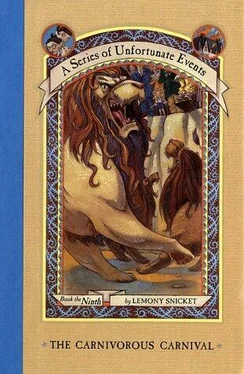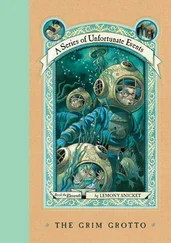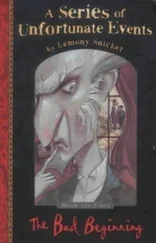Lemony Snicket - The Carnivorous Carnival
Здесь есть возможность читать онлайн «Lemony Snicket - The Carnivorous Carnival» весь текст электронной книги совершенно бесплатно (целиком полную версию без сокращений). В некоторых случаях можно слушать аудио, скачать через торрент в формате fb2 и присутствует краткое содержание. Год выпуска: 2002, Жанр: Прочие приключения, на английском языке. Описание произведения, (предисловие) а так же отзывы посетителей доступны на портале библиотеки ЛибКат.
- Название:The Carnivorous Carnival
- Автор:
- Жанр:
- Год:2002
- ISBN:нет данных
- Рейтинг книги:5 / 5. Голосов: 1
-
Избранное:Добавить в избранное
- Отзывы:
-
Ваша оценка:
- 100
- 1
- 2
- 3
- 4
- 5
The Carnivorous Carnival: краткое содержание, описание и аннотация
Предлагаем к чтению аннотацию, описание, краткое содержание или предисловие (зависит от того, что написал сам автор книги «The Carnivorous Carnival»). Если вы не нашли необходимую информацию о книге — напишите в комментариях, мы постараемся отыскать её.
The Carnivorous Carnival — читать онлайн бесплатно полную книгу (весь текст) целиком
Ниже представлен текст книги, разбитый по страницам. Система сохранения места последней прочитанной страницы, позволяет с удобством читать онлайн бесплатно книгу «The Carnivorous Carnival», без необходимости каждый раз заново искать на чём Вы остановились. Поставьте закладку, и сможете в любой момент перейти на страницу, на которой закончили чтение.
Интервал:
Закладка:
"There's another sound, too," Colette said. "Listen."
The children listened and heard that the contortionist had spoken the truth. Accompanying the roar of the engine was another roar, one that sounded deeper and angrier than any automobile. The Baudelaires knew that you cannot judge something by its sound any more than you can judge a person by the way they look, but this roar was so loud and fierce that the youngsters could not imagine that it brought good news.
Here I must interrupt the story I am writing, and tell you another story in order to make an important point. This second story is fictional, a word which here means "somebody made it up one day," as opposed to the story of the Baudelaire orphans, which somebody merely wrote down, usually at night. It is called "The Story of Queen Debbie and Her Boyfriend, Tony," and it goes something like this:
The Story of Queen Debbie and her boyfriend, Tony. Once upon a time, there lived a fictional queen named Queen Debbie, who ruled over the land where this story takes place, which is made up. This fictional land had lollipop trees growing everywhere, and singing mice that did all of the chores, and there were fierce and fictional lions who guarded the palace against fictional enemies. Queen Debbie had a boyfriend named Tony, who lived in the neighboring fictional kingdom. Because they lived so far away, Debbie and Tony couldn't see each other that often, but occasionally they would go out to dinner and a movie, or do other fictional things together.
Tony's birthday arrived, and Queen Debbie had some royal business and couldn't travel to see him, but she sent him a nice card and a myna bird in a shiny cage. The proper thing to do if you receive a present, of course, is to write a thank-you note, but Tony was not a particularly proper person, and Called Debbie to complain.
"Debbie, this is Tony," Tony said. "I got the birthday present you sent me, and I don't like it at all."
"I'm sorry to hear that," Queen Debbie said, plucking a lollipop off a nearby tree. "I picked out the myna bird especially for you. What sort of present would you prefer?"
"I think you should give me a bunch of valuable diamonds," said Tony, who was as greedy as he was fictional "Diamonds?" Queen Debbie said. "But myna birds can cheer you up when you are sad. You can teach them to sit on your hand, and sometimes they even talk."
"I want diamonds," Tony said.
"But diamonds are so valuable," Queen Debbie said. "If I send you diamonds in the mail, they'll probably get stolen on their way to you, and then you won't have any birthday present at all."
"I want diamonds," whined Tony, who was really becoming quite tiresome.
"I know what I'll do," Queen Debbie said with a faint smile. "I'll feed my diamonds to the royal lions, and then send the lions to your kingdom. No one would dare attack a bunch of fierce lions, so the diamonds are sure to arrive safely."
"Hurry up," Tony said. "It's supposed to be my special day."
It was easy for Queen Debbie to hurry up, because the singing mice who lived in her palace did all of the necessary chores, so it only took a few minutes for her to feed a bunch of diamonds to her lions, wrapping the jewels in tuna fish first so the lions would agree to eat them. Then she instructed the lions to travel to the neighboring kingdom to deliver the present.
Tony waited impatiently outside his house for the rest of the day, eating all of the ice cream and cake and teasing his myna bird, and finally, at just about sunset, he saw the lions approaching on the horizon and ran over to collect his present.
"Give me those diamonds, you stupid lions!" Tony cried, and there is no need to tell you the rest of this story, which has the rather obvious moral "Never look a gift lion in the mouth." The point is that there are times where the arrival of a bunch of lions is good news, particularly in a fictional story where the lions are not real and so probably will not hurt you. There are some cases, as in the case of Queen Debbie and her boyfriend, Tony, where the arrival of lions means that the story is about to get much better.
But I am sad to say that the case of the Baudelaire orphans is not one of those times. The story of the Baudelaires does not take place in a fictional land where lollipops grow on trees and singing mice do all of the chores. The story of the Baudelaires takes place in a very real world, where some people are laughed at just because they have something wrong with them, and where children can find themselves all alone in the world, struggling to understand the sinister mystery that surrounds them, and in this real world the arrival of lions means that the story is about to get much worse, and if you do not have a stomach for such a story–any more than lions have a stomach for diamonds not coated in tuna fish–it would be best if you turned around right now and ran the other way, as the Baudelaires wished they could as they exited the caravan and saw what Count Olaf had brought with him when he returned from his errand.
Count Olaf drove his black automobile between the rows of caravans, nearly running over several visitors to the carnival, stopped right at the tent for the House of Freaks, and turned off the engine, which ended the creaky roar the children had recognized. But the other, angrier roar continued as Olaf got out of the car, followed by Madame Lulu, and pointed with a flourish to a trailer that was attached to the rear of the automobile. The trailer was really more of a metal cage on wheels, and through the bars of the cage the Baudelaires could see what the villain was pointing at.
The trailer was filled with lions, packed in so tightly that the children couldn't tell just how many there were. The lions were unhappy to be traveling in such tight quarters, and were showing their unhappiness by scratching at the cage with their claws, snapping at one another with their long teeth, and roaring as loudly and as fiercely as they could. Some of Count Olaf's henchmen gathered around, along with several visitors to the carnival, to see what was going on, and Olaf tried to say something to them, but couldn't be heard over the lions' roars. Frowning, the villain removed a whip from his pocket and whipped at the lions through the trailer bars. Like people, animals will become frightened and likely do whatever you say if you whip them enough, and the lions finally quieted down so Olaf could make his announcement.
"Ladies and gentlemen," he said, "boys and girls, freaks and normal people, Caligari Carnival is proud to announce the arrival of these fierce lions, who will be used in a new attraction."
"That's good news," said someone in the crowd, "because the souvenirs in the gift caravan are pretty lousy."
"It is good news," Count Olaf agreed with a snarl, and turned to face the Baudelaires. His eyes were shining very brightly, and the siblings shivered in their disguises as he looked at the children and then at the gathering crowd. "Things are about to get much better around here," he said, and the Baudelaire orphans knew that this was as fictional as anything they could imagine.
Chapter Five
If you have ever experienced something that feels strangely familiar, as if the exact same thing has happened to you before, then you are experiencing what the French call "déjà vu."
Like most French expressions–"ennui," which is a fancy term for severe boredom, or "la petite mort," which describes a feeling that part of you has died–"" refers to something that is usually not very pleasant, because it is curious to feel as if you have heard or seen something that you have heard or seen before. and experiencing the queasy feeling of déjà.
"These lions are going to be the most exciting thing at Caligari Carnival!" Olaf announced, as more and more people drew near to see what all the fuss was about. "As you all know, unless you are incredibly dim-witted, a stubborn mule will move in the proper direction if there is a carrot in front of it, and a stick behind it. It will move toward the carrot, because it wants the reward of food, and away from the stick, because it does not want the punishment of pain. And these lions will do the same."
Читать дальшеИнтервал:
Закладка:
Похожие книги на «The Carnivorous Carnival»
Представляем Вашему вниманию похожие книги на «The Carnivorous Carnival» списком для выбора. Мы отобрали схожую по названию и смыслу литературу в надежде предоставить читателям больше вариантов отыскать новые, интересные, ещё непрочитанные произведения.
Обсуждение, отзывы о книге «The Carnivorous Carnival» и просто собственные мнения читателей. Оставьте ваши комментарии, напишите, что Вы думаете о произведении, его смысле или главных героях. Укажите что конкретно понравилось, а что нет, и почему Вы так считаете.












